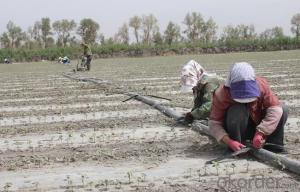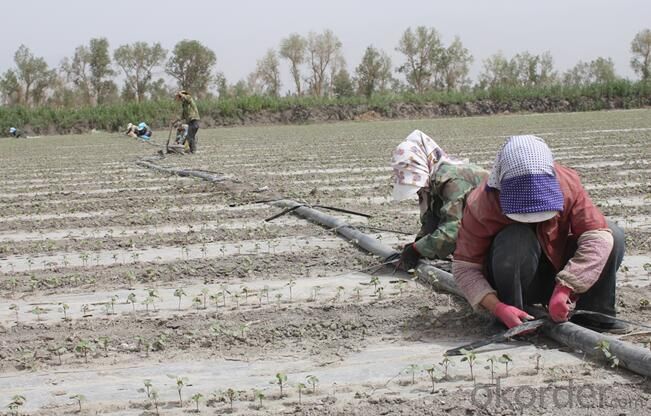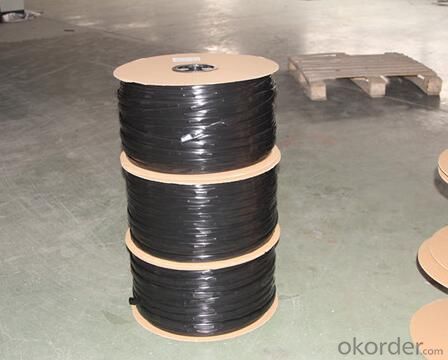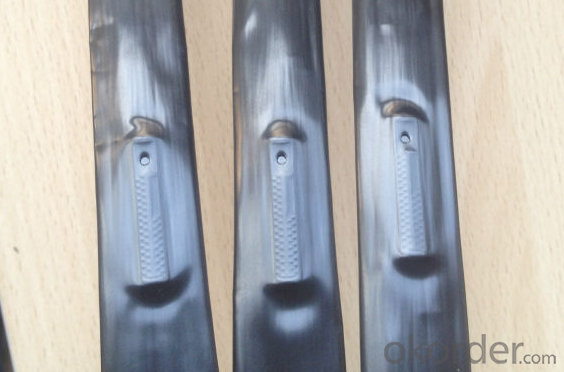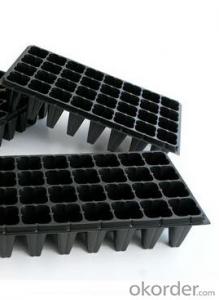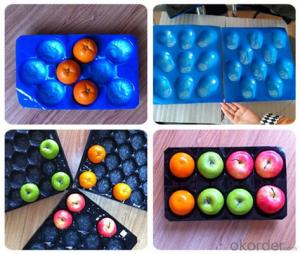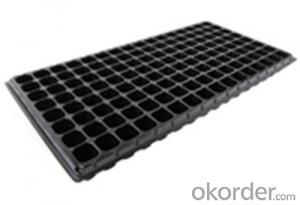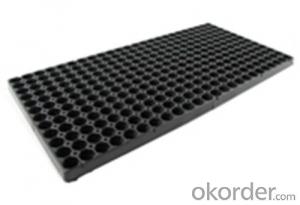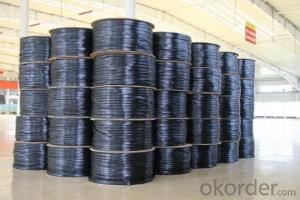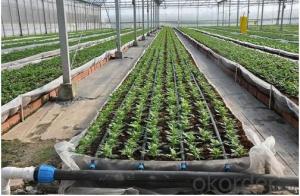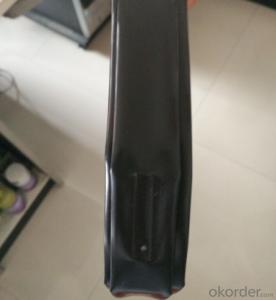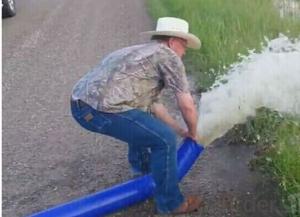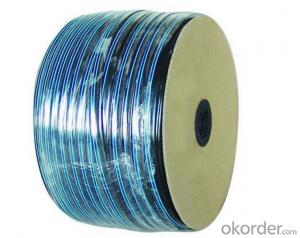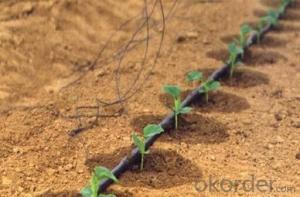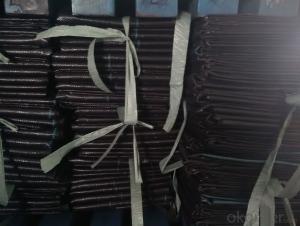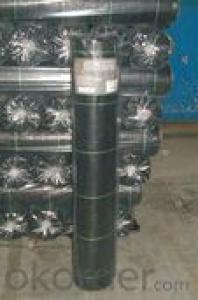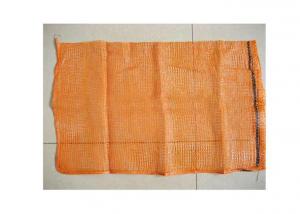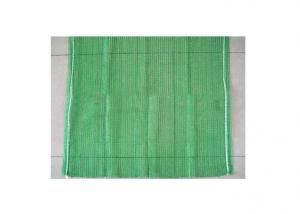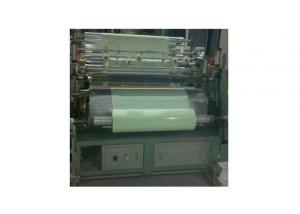Water irrigation Dripper Drip Tape Drip Irrigation System, Ro-Drip Drip Tape
- Loading Port:
- Tianjin
- Payment Terms:
- TT OR LC
- Min Order Qty:
- 199 m²
- Supply Capability:
- 1999999 m²/month
OKorder Service Pledge
OKorder Financial Service
You Might Also Like
Product Features of Water irrigation Dripper Drip Tape Drip Irrigation System, Ro-Drip Drip Tape:
1. The Water Margin: unilateral 1~3 meters, 2~6 meters bilateral
2. Save 50-80% labor, 40-80% water, 50% fertilizer and increase production 10-30%
3. High quality raw materials of high strength PE from the German Basf Inc and ultraviolet resistance ratio
4. Laboratory Simulated Ecological testing anti-aging life of 3 years, the actual use of the ageing time longer; low supporting the water pressure, less energy consumption
5. Supporting pipeline water supply pressure [2~3Bar] lower, low energy consumption
6. Scientific aperture distribution design, smooth aperture not easy to block and high spraying uniformity, ensure the normal use in breezeless and breeze day, ideal for drizzle days
7. Designed for flexible use,easy to coil, no shortage for length
8. Uniform irrigation, large irrigation area, increase production
9. Products passed the inspection of the national authority Chinese inspection department
10. Easy storage and transportation, simple and convenient for installation and the operation
Water irrigation Dripper Drip Tape Drip Irrigation System, Ro-Drip Drip Tape
Adopt the high quality low density polyethylene resin joined the anti-aging masterbatch by extrusion molding process of plastic pipe.
Material: Low density polyethylene resin
Performance: Non-toxic, odorless, acid corrosion, fluid resistance is small, easy to install.
The Application of Water irrigation Dripper Drip Tape Drip Irrigation System, Ro-Drip Drip Tape:
The layflat hose has a wealth of residential and commercial applications, and it is usually used for general water transfer purposes as well as for submain.Generally layflat hoses are used in the industry of agriculture,in pipe lining and rehabilitation,in removing waste water,in mine dewatering ,in the chemical industry and even for household chores
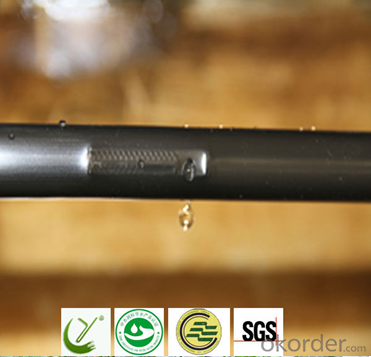
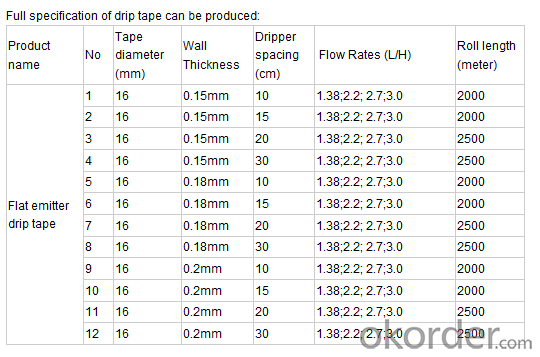
The decription of Water irrigation Dripper Drip Tape Drip Irrigation System, Ro-Drip Drip Tape
Two layers of PVC bonded together encapsulating high tensile polyester fibers.
Thick wall dimensions and strong yarn structure help products to hold connections and resist bursting.
It assumes the conventional round appearance when pressure is being passed through it and then returns to its flat shape after use.It does not need drying and can be rolled immediately after use.
Features of Water irrigation Dripper Drip Tape Drip Irrigation System, Ro-Drip Drip Tape
1.Great durability mainly given by the reinforcement and high-density PVC material.
2.The layflat hoses can have up to 12 inches diameter based on their applications.
3.Extra thickness are added in order to prevent bursting due to pressure in heavy industry.
4.Can be easily rolled up,stored and reused,as it has a very durable construction.
5.The hoses come with a variety of fittings and accessories ensures the water transfer process free of leaking.
6.Temperature range:-5°C~65°C(23~149F)
FAQ Water irrigation Dripper Drip Tape Drip Irrigation System, Ro-Drip Drip Tape
1.Q:Are you manufactory or trade company?
A:We are the Manufactory specialized in drip irrigation more than 20 years; Our factory have passed IS09000.
2.Q:How can I get the samples?
A:If you need some samples to test, we can make as per your request .You should pay for the transportation freight of samples and our samples cost, while the samples cost can be refundable after you place the order if the amount meets our requirement.
3.Q:How much the transportation freight of samples?
A:The freight depends on the weight and packing size and your area.
4.Q:How long can I expect to get the sample?
A:The samples will be ready for delivery within one week. The samples will be sent via express and arrive in 7-10 days.
5.Q:Can we have our Logo or company name to be printed on your products or package?
A:Sure.Your Logo can be put on your products by Hot Stamping,Printing,Embossing,UV Coating,Silk-screen Printing or Sticker
- Q: What are some ground cover options for a woodland courtyard?
- Some ground cover options for a woodland courtyard include moss, ferns, hostas, vinca minor, creeping thyme, and sweet woodruff.
- Q: Is it possible to use biodegradable seedling nets or covers to protect seedlings instead of traditional non-biodegradable ones?
- <p>Yes, seedlings can be effectively protected using biodegradable seedling nets or covers as an alternative to traditional non-biodegradable options. These biodegradable materials, often made from plant-based polymers or natural fibers, provide the necessary protection against pests and environmental stressors while also decomposing naturally after a certain period, reducing waste and environmental impact. They offer a sustainable solution that supports the growth of healthy seedlings without compromising the integrity of the ecosystem.</p>
- Q: How do agricultural plastic products help with moisture retention?
- Agricultural plastic products, such as mulch films and drip irrigation systems, help with moisture retention by creating a barrier that prevents water evaporation from the soil. This barrier reduces the amount of water lost to evaporation, keeping the soil moist for longer periods and ensuring that plants have a steady supply of water for optimal growth.
- Q: Can nursery trays be used for starting herbaceous perennials?
- Yes, nursery trays can be used for starting herbaceous perennials. These trays provide an ideal environment for seed germination and early plant growth. The compartments in the tray allow for individual seedlings to be grown separately, ensuring proper spacing and preventing root entanglement. Additionally, the trays can be easily moved and transferred to larger pots or garden beds once the seedlings have grown stronger.
- Q: What are some innovative uses of agricultural plastic products?
- Some innovative uses of agricultural plastic products include creating greenhouse structures, mulching films to conserve water and control weeds, drip irrigation systems for efficient water usage, agricultural nets for pest control, and biodegradable seedling trays for sustainable planting.
- Q: Can nursery trays be used for starting plants from cuttings?
- Yes, nursery trays can be used for starting plants from cuttings. Nursery trays provide a controlled environment for the cuttings, allowing them to establish roots and grow into healthy plants. The trays also help in organizing and easily monitoring the progress of the cuttings.
- Q: How do you choose ground cover for a tropical rainforest garden?
- When choosing ground cover for a tropical rainforest garden, it is important to consider the natural environment and conditions of a rainforest. Opt for plants that thrive in high humidity, shade, and moist soil. Look for species that have dense foliage to help suppress weed growth and retain moisture. Furthermore, select ground covers that are native to rainforest regions, as they are better adapted to the local climate and ecosystem.
- Q: How do you prevent ground cover plants from becoming invasive in natural areas?
- To prevent ground cover plants from becoming invasive in natural areas, it is important to carefully select and introduce non-invasive species. Conducting thorough research on the growth habits and potential invasiveness of the plants is crucial. Regular monitoring and early detection of any signs of invasiveness are necessary to take immediate action, such as removing or controlling the plants before they spread. Additionally, promoting biodiversity by incorporating a variety of native plants can help prevent the dominance of any one species and maintain a balanced ecosystem.
- Q: Can nursery trays be used for growing orchids?
- Yes, nursery trays can be used for growing orchids. Nursery trays provide a convenient and cost-effective way to grow multiple orchids in a controlled environment. They allow for proper drainage and organization of orchid plants, making it easier to monitor their growth and care for them effectively.
- Q: Can agricultural plastic products be used for tissue culture?
- Yes, agricultural plastic products can be used for tissue culture. These products, such as pots, trays, and containers, can provide a sterile and controlled environment for the growth of plant tissues. They are cost-effective and easily available, making them suitable for tissue culture applications in agriculture.
Send your message to us
Water irrigation Dripper Drip Tape Drip Irrigation System, Ro-Drip Drip Tape
- Loading Port:
- Tianjin
- Payment Terms:
- TT OR LC
- Min Order Qty:
- 199 m²
- Supply Capability:
- 1999999 m²/month
OKorder Service Pledge
OKorder Financial Service
Similar products
Hot products
Hot Searches
Related keywords
